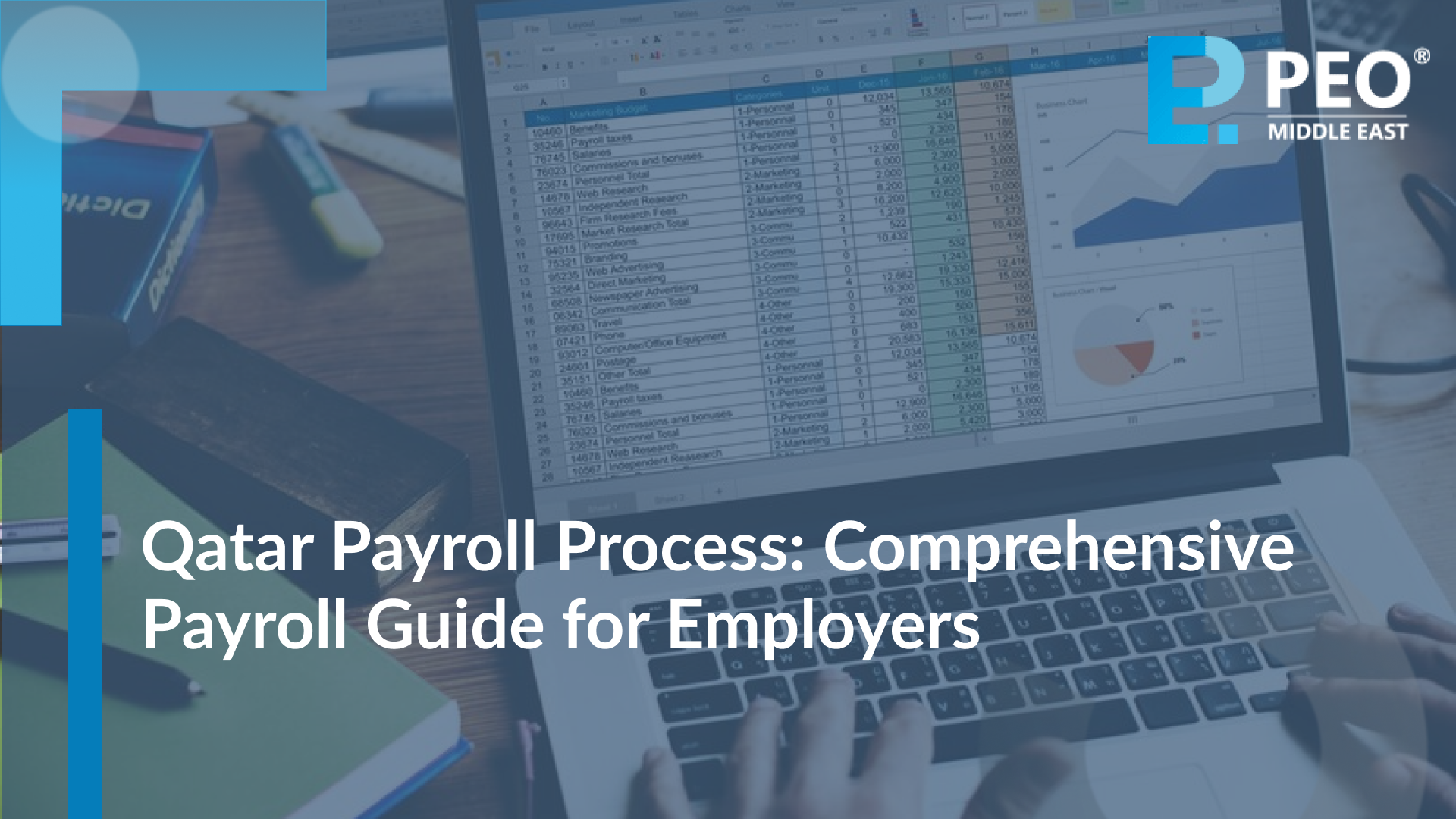Running a business smoothly relies on smartly managing payroll management by Qatar payroll process. Employers need to be in the know of relevant regulations in effect. That’s how they will ensure compliance and fair treatment of their employees.
There are many stages to Qatar payroll process. in this article, you will find details on payroll in Qatar. This way you will understand its ins and outs clearly.
How is Payroll Calculated in Qatar?
The payroll calculation in Qatar involves determining what an employee is entitled to receive. It considers their basic salary, allowances and deductions.
The process takes into account working hours, overtime and any other benefits specified by Qatari labor law. Companies should use an organized payroll system. This will help them keep accurate records and comply with regulations.
Payroll calculation in Qatar is organized. It makes sure that employees receive their accurate entitled salary and benefits. Companies should be using automated payroll systems. These calculate payments based on predefined formulas. This way compliance will be maintained.
Influences on Payroll Calculations
- Employment Contract Type
Calculation of wages and benefits is affected considering if the contract is full-time, part-time or temporary.
- Job Role and Industry Standards
Salaries can differ with job role and specific industry. Higher-paying industries of oil and gas have set different standards.
- Allowances and Benefits
Many allowances are included in the gross pay. These consist of
- Transportation
- Housing
- meal allowances
Minimum Salary in Qatar
In Qatar, there is a minimum wage policy. Employers have to follow it. Employers must ensure their payroll system reflects this. That’s how they will be able to avoid penalties and fulfill legal requirements. Companies need to also include different allowances the law has made compulsory.
The minimum wage in Qatar is set to protect workers’ rights. It provides them with a standard of living. As of recent regulations, the minimum wage stands at
- QAR 1,000 per month
- employers are to provide QAR 300 for food
- QAR 500 for accommodation
Make sure your payroll system reflects these components. This means each employee receives their minimum wage and allowances. Not complying will result in penalties and legal action.
Salary payments to employees in Qatar
When it comes to salary payments, companies are required to pay employees through approved channels. This way all transactions are documented. You will have to provide details of the salary components. This consists of their basic pay and additional allowances.
Wage Protection System is how the salary payments need to be processed. Transparency and compliance with Qatari labor laws is maintained too as a result.
The WPS is designed to protect workers’ rights. It makes compulsory for all salaries to be transferred through approved banks.
Points to Note for Salary Payments:
- Payments should be made on time. This means during the first seven days of the following month.
- Provide detailed pay slips that outline all salary components
- Maintain records of all salary transactions as proof of compliance for audits
Pay components for employees and statutory Deductions
Employees in Qatar receive different pay components. This involves allowances for housing, transportation and the likes. As employers you will be deducting contributions too. These are for social security and other statutory requirements. This helps businesses maintain an accurate and compliant payroll.
This is what employee salaries consist of.
- Basic Salary
This is the core amount agreed upon in the employment contract.
- Allowances
Employees receive extra allowances
- Bonuses and Incentives
Performance-based bonuses are also a part of payroll in many companies.
- Statutory Deductions
Social security contributions and specific taxes apply to certain categories of employees. Correct calculations and record maintaining are required for this.
Working Hours and Overtime
Qatari labor law outlines the standard working hours. They consist of eight hours per day. Employees working beyond this time are eligible for overtime compensation. Employers incorporate overtime calculations into their payroll system. This way workers receive fair pay for all extra hours worked.
End of Service Gratuity
A major element of payroll Qatar is end of service gratuity. Employees are eligible to receive a gratuity payment when their service is completed. Employers calculate this considering the employee’s duration of service and salary structure.
The end of service gratuity is a huge benefit for employees in Qatar. Employers are legally required to provide this gratuity after an employee’s contract ends. The calculation of EOSG takes length of service and the employee’s basic salary at the time of termination into account.
Calculation Method for EOSG
- Employees who have worked for one year – or more – will receive a gratuity payment. It will be equal to three weeks’ basic pay for each year of service.
- Employers update payroll records regularly. Track each employee’s eligibility for this benefit.
Qatar WPS
Qatar’s Wage Protection System calls for companies to transfer employee wages through authorized financial channels. This system ensures that salaries are paid on time and documented correctly. It offers transparency for employers and employees. Compliance with the WPS helps businesses operate without legal issues.
The Qatar Wage Protection System ensures that all companies operating in Qatar comply with wage payment regulations. Employers have to register their company with the WPS. The salaries are then transferred electronically through approved banks.
Advantages of WPS
- It promotes transparency as employees receive their salaries on time and without discrepancies
- It helps employers maintain organized payroll records
- It reduces the risk of errors or legal complications
- The system is monitored by Qatar’s MADLSA. This provides an extra layer of oversight to protect workers’ rights.
Statutory Leaves in Qatar
Employees in Qatar are entitled to many statutory leaves. Employers must factor these leaves into their payroll processes. This makes sure that all entitlements are recorded and paid appropriately.
Understanding statutory leave entitlements helps employers and employees in Qatar. Leave entitlements are defined by labor laws. Your payroll systems should be accurately reflected that too.
Sick Leave
Employees can avail of sick leave as per the labor laws in Qatar. Sick leave payments are usually structured based on the duration of the employee’s illness. Payroll systems should record these leaves accurately to calculate the corresponding payments.
Employees are entitled to sick leave with pay, provided they submit a medical certificate approved by the relevant authorities. The sick leave policy includes:
- Full pay for the first two weeks of absence
- Half pay for the next four weeks
- If the illness persists beyond six weeks, the leave becomes unpaid
Maternity Leave
Female employees in Qatar are entitled to paid maternity leave. Employers must ensure that their payroll reflects this benefit. Their maternity leave is to be correctly compensated as per the law.
Annual Leave
Annual leave entitlements are a standard provision in Qatar. Employers provide paid annual leave to employees, with the number of days decided by their tenure. This leave is documented in the payroll system.
Hajj Leave
Employees who wish to perform Hajj can take unpaid leave for this purpose. Employers will accommodate this leave request in their payroll system. This makes certain that employee records are updated correctly.
Step-by-step Process of Payroll Processing in Qatar
Being successful in managing payroll calls for going through some particular steps. These are indicated by Qatari regulations. This systematic style means salaries are processed precisely. Not to mention it reduces potential human errors too.
Managing payroll in Qatar requires an organized attitude. We share how you can make sure that payroll processing is accurate as well as compliant.
We share the entire step by step payroll process as promised.
Registration of employees into the payroll system
The first step is to register all employees into the payroll system. This ensures that each employee’s details are recorded.
Finalize the gross pay
Employees are registered. Now it’s time to finalize their gross pay. This involves adding all allowances and basic pay components. Check that the gross pay aligns with the contractual agreements and legal requirements.
Other than basic salary, employers will count all allowances, bonuses and benefits. Payroll systems will calculate the gross pay. The system will double check the terms listed out in employment contracts are met.
Gross Pay Components to Consider
- Basic salary and bonuses
- Allowances for housing, transportation and food
- Other benefits like health insurance
Consider the deductions
Employers must then apply the necessary deductions. This consists of
- social security contributions
- taxes
- other statutory deductions
Proper documentation of these deductions is the way to go for maintain transparency.
Make necessary corrections
After calculating the deductions, employers should review the payroll records to make any necessary corrections. This involves rectifying any errors in employee details and pay calculations. Ensuring accuracy at this stage helps prevent issues during payroll disbursement.
Payroll records
Maintaining accurate payroll records is essential for compliance. Employers must ensure that all payroll data is stored securely. This includes
- salary slips
- deductions
- leave records
Qatar Payroll Options for Companies
Companies in Qatar have many payroll options available to them. Businesses can choose to manage payroll internally. Or they can consider payroll process outsourcing. Payroll outsourcing Qatar has become popular.
Businesses in Qatar have many options when it comes to managing their payroll.
- In-house Payroll Systems
Companies can decide they want their payroll handled internally. For this, they can get a dedicated software and a payroll team.
- Outsourcing Payroll
This is a popular option. It allows businesses to focus on their core activities. Outsourcing payroll to experts results in timely salary processing. It lowers the chances of legal risks too.
Entitlement and Termination Terms
Employees in Qatar have the right to certain benefits during their employment. These include end-of-service gratuity, leave entitlements and other allowances.
When it comes to termination, employers follow the terms. These are outlined in employment contracts and labor laws. Accurate payroll processing means there are no discrepancies encountered. And all entitlements are met.
Employees in Qatar have specific entitlements. Manage them correctly during employment and termination. Avoid disputes by following these rules.
Termination Terms Include:
- Providing adequate notice as stipulated in the employment contract
- Calculating end of service gratuity accurately
- Paying all outstanding salary, allowances and leave entitlements
Keep detailed records of entitlements and termination processes. This helps companies to protect themselves legally.
How PEO Middle East Can Help with Payroll in Qatar?
Generic solutions are not how we roll. Nor it’s how we operate. We offer customized payroll solutions for companies. When you partner with us, we simplify payroll processes in Qatar.
PEO Middle East manages all aspects of payroll. This empowers companies to focus on their core operations.
With expertise in Qatari labor laws and payroll systems, PEO Middle East assists businesses by:
- Managing all payroll activities, including salary disbursements and statutory reporting
- Ensuring compliance with WPS and Qatari labor regulations
- Handling employee benefits, allowances and end-of-service gratuities
Benefits of Choosing PEO Middle East
- You get access to a team of experts. They understand the complexities of payroll in Qatar.
- Reduced risk of violating regulations
- Improved efficiency in managing payroll records and processes
Conclusion
Understanding the Qatar payroll process how you can manage a compliant and successful business operation. Be it salary payments or statutory deductions, every aspect need to be handled properly.
Contact us for our services of managing Qatar payroll process.
FAQs
What is the overview of payroll cycle?
The payroll cycle in Qatar usually involves
- calculating salaries
- making necessary deductions
- disbursing payments through authorized financial channels.
What is a payroll detail summary?
For Qatar payroll process an overview is there. It lists out each employee’s pay components
What is the role of a payroll processor?
A payroll processor manages the entire payroll process. They make certain that
- salaries are calculated accurately
- deductions are applied
- payments are made on time
- compliance is maintained with Qatari labor laws
payroll records are updated






